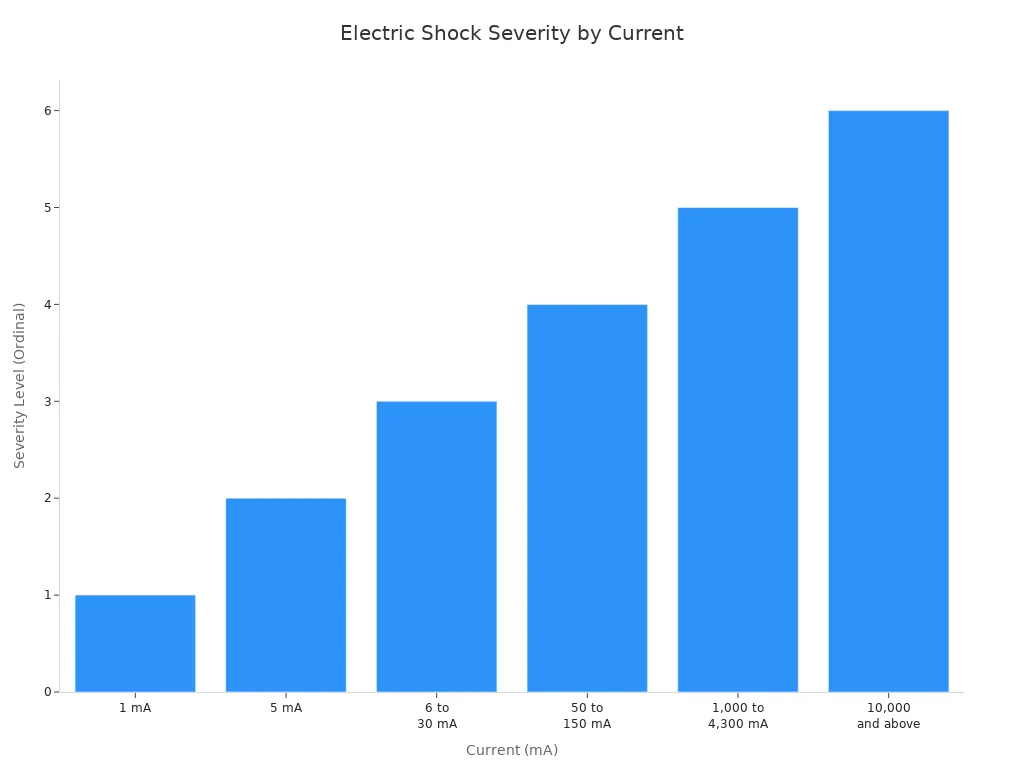A ground fault happens when electricity leaves its normal path. This can happen if insulation is damaged, water gets in, wiring is bad, appliances break, or the environment causes problems. These things can be very dangerous. They can cause electric shocks, fires, or damage to equipment. People are at more risk where there is moisture or bad wiring. Doing safety checks often and using devices like GFCIs can stop accidents. These steps help keep homes and workplaces safe.
Key Takeaways
- Ground faults happen when electricity goes off its usual path. This can cause shocks, fires, or damage. Damaged insulation, water, bad wiring, and broken appliances often cause ground faults. GFCI devices shut off power fast to stop shocks and fires. They work best in wet places like kitchens and bathrooms. Checking wires and taking care of appliances helps find problems early. Fixing them stops harm before it starts. Safe habits and using the right devices keep homes and workplaces safe from electrical dangers.
What Is a Ground Fault
Simple Definition
A ground fault is a problem with electricity. It happens when electricity leaves its normal path and goes to the ground in a shortcut. The National Electrical Code says a ground fault is when an electric wire touches something grounded, like metal or the earth. This can happen by accident or on purpose. When this happens, electricity can go where it should not. It might flow through a person’s body or a metal case. This is very dangerous. It can cause electric shocks or fires. Devices called Ground Fault Circuit Interrupters (GFCIs) help keep people safe. They turn off the power fast if they sense a ground fault.
Note: GFCIs are very important in places like bathrooms, kitchens, and outside. These places have water and electricity close together.
How It Happens
A ground fault can start in many ways. In homes and businesses, it often starts with bad wiring or broken equipment. Here are some common ways a ground fault can happen:
1. Old or broken insulation lets wires touch things like metal boxes. 2. Water or dampness gets into outlets or breaker boxes. This makes it easier for electricity to escape. 3. Electrical equipment breaks, wears out, or is not put in right. 4. People make mistakes, like using extension cords wrong or touching live wires. 5. Lightning can hit and send a surge of electricity that causes a ground fault. 6. Bad grounding of equipment makes weak spots in the system.
When a ground fault happens, electricity leaves its safe path and goes into the ground. This can make circuit breakers trip or cause shocks. Bathrooms, kitchens, and outdoor outlets are places where ground faults happen a lot. This is because of moisture and heavy use.
Ground Fault Causes
Damaged Insulation
Damaged insulation is a main reason for a ground fault. Insulation covers wires and keeps electricity safe. If insulation breaks, the wire gets exposed. This can happen when wires are pulled over sharp metal. Cords dragged on rough surfaces can also get damaged. Nails or staples can poke through insulation. Heat, water, and age make insulation weak over time. Even small cracks let electricity escape. For example, a worker might pull a wire too hard. The insulation scrapes off in a metal raceway. This damage lets electricity go to the ground. This can cause shocks or fires. Checking wires often helps find problems early.
Tip: Always look at cords and wires for cracks or metal showing.
Water and Moisture
Water and moisture make it easy for electricity to reach the ground. If water leaks into breaker boxes or outlets, it lowers resistance. This makes a ground fault more likely. Bathrooms, kitchens, and outside areas are at higher risk. These places have both water and electricity. For example, a leaking pipe above a breaker box can drip water. This can shut down equipment again and again. Moisture can also rust wires and weaken insulation. Using GFCI outlets in wet places helps stop accidents. They turn off power fast if a ground fault happens.
- Water leaking into electrical boxes or pipes
- Moisture getting into disconnect boxes
- Wet pipes rusting wires
Faulty Wiring
Bad wiring is another big cause of ground faults. Problems start with loose wires or wrong connections. Cables can get damaged by nails or screws. Rodents may chew wires and take off insulation. In new buildings, wiring mistakes can be hidden. For example, a loose wire in an outlet can touch metal. This gives electricity a way to escape. Checking wiring often and hiring pros helps lower the risk.
- Broken or old insulation on wires
- Loose wires or wrong connections
- Damage from nails, screws, or rodents
Appliance Issues
Appliances can cause ground faults if cords or wiring are bad. Small kitchen appliances like electric grills or hair dryers can be recalled for shock risks. Big appliances like washing machines or irons can be unsafe if not grounded right. For example, if a washing machine is grounded but an iron is not, touching both can be dangerous. Electricity can go through a person’s body. Kitchens are the most common place for fires and injuries from bad appliances. Using GFCI outlets in kitchens, bathrooms, and laundry rooms helps protect people.
| Appliance Type | Risk Example |
|---|---|
| Small Kitchen Appliances | Electric grills, bread makers, hair dryers |
| Large Household Appliances | Washing machines, clothes irons |
| Household Areas | Kitchen (high risk for electrical fires/injuries) |
Environmental Factors
The environment can cause ground faults too. High humidity and heat bring in rodents. Rodents chew wires and break insulation. This exposes wires and raises the risk. Humidity can make water collect on wires and in boxes. This helps electricity escape. Hot and cold weather, sunlight, and chemicals can break down insulation. For example, a damp basement with little air can bring rodents and mold. Both can hurt wiring. Sealing cables, using jackets that block sunlight, and keeping places dry help stop these problems.
- High humidity and heat bring rodents that chew wires
- Moisture and bad air flow break down insulation
- Sunlight and chemicals wear out insulation
Note: Controlling humidity and keeping electrical areas dry and clean lowers the chance of ground faults from the environment.
Ground Fault Risks
Electric Shock
Electric shock is a big danger from a ground fault. When electricity leaves its path, it can go through a person. Even a little current can hurt someone. For example, more than 8 milliamps can cause pain and muscle loss. Higher currents are even more dangerous. The table below shows what happens at different current levels:
| Current (mA) | Typical Severity Level and Effects |
|---|---|
| 1 | Perception level; faint tingle |
| 5 | Slight shock; most can let go; involuntary reactions possible |
| 6 to 30 | Painful shock; loss of muscular control |
| 50 to 150 | Extreme pain; respiratory arrest; severe muscle contractions; death possible |
| 1,000 to 4,300 | Ventricular fibrillation; nerve damage; death likely |
| 10,000 and above | Cardiac arrest; severe burns; probable death |

GFCIs can find small leaks of current, as low as 4-6 milliamps. They shut off power very fast, in less than 0.025 seconds. This quick action stops electrocution. Since GFCIs became common, electrical deaths dropped by 83%.
Fire Hazard
A ground fault can also start a fire. When electricity finds a new path, it can make heat or sparks. Sparks can light things like wood, paper, or insulation on fire. Wet places like kitchens, bathrooms, and garages have more fire risk. GFCIs help stop many fires by turning off power before a fire starts. Installing them right and checking them often lowers fire danger at home or work.
Property Damage
A ground fault can ruin property. Fires can burn walls, appliances, and things people own. Surges can break expensive equipment or cause blackouts. Water leaks that touch wires can cause both shocks and damage. Insurance claims for fires and broken equipment cost families and businesses a lot of money each year. Checking systems often and following rules helps keep property safe.
Tip: Keeping electrical systems in good shape keeps people and property safe from ground faults.
Prevention Tips
Inspections
Regular inspections help stop electrical dangers. Homeowners and businesses should check their wiring every three to five years. Older homes may need checks every two years. Inspectors look for broken wires and loose parts. They also check for signs of damage. Tools like multimeters test voltage. Insulation resistance testers check wire safety. Visual checks look at outlets, switches, and circuit breakers. Inspectors look for burn marks or loose parts. After big storms or renovations, get an inspection right away. Professionals write down what they find and fix problems fast. These steps help lower the risk of a ground fault.
Tip: Always use licensed electricians for full inspections and repairs.
GFCI Protection
Ground Fault Circuit Interrupters (GFCIs) keep people safe from electric shock. GFCIs watch the flow of electricity. They turn off power if they sense trouble. They act in less than a second to stop shocks and fires. Put GFCIs in bathrooms, kitchens, laundry rooms, garages, basements, and outside. Test GFCIs every month. Press the “Test” and “Reset” buttons to check them. Replace any GFCI that does not work. GFCIs are very important where water is close by.
- Bathrooms (within six feet of sinks)
- Kitchens (near sinks and appliances)
- Outdoor outlets and garages
- Basements and crawl spaces
Appliance Care
Taking care of appliances helps stop electrical problems. Clean appliances often to get rid of dust and dirt. Check cords for cuts or fraying. Replace them if they are damaged. Make sure each appliance is grounded. Do not plug too many things into one outlet. Use GFCIs in wet places. Call a pro for repairs and installation. These steps keep appliances safe and help stop ground faults.
| Appliance Care Steps | Why It Matters |
|---|---|
| Clean and inspect regularly | Stops dust and moisture buildup |
| Replace damaged cords | Prevents shocks and fires |
| Ensure proper grounding | Directs stray current safely |
| Avoid overloading outlets | Reduces risk of faults |
Safe Practices
Good habits keep people and property safe from electrical dangers. Keep electrical things away from water. Use covers made for outdoor outlets. Test GFCIs every month to make sure they work. Use outdoor-rated extension cords and check for damage. Unplug appliances when you are not using them. Label the electrical panel for quick help in emergencies. Teach everyone at home or work about electrical safety. Call a pro to fix any problems right away.
Note: GFCI protection is needed by code in wet places. Testing and taking care of these devices keeps them working right.
Knowing about electrical safety helps you stay safe. Things like damaged insulation, water, bad wiring, and broken appliances can be dangerous. These problems can cause shocks or fires. Checking wires often and using good wiring helps a lot. GFCI devices in wet places stop many accidents. The National Electrical Code and UL rules say GFCIs must turn off power fast. This keeps people safe from getting hurt. Simple habits help too. Keep appliances dry and test safety devices every month. These steps make homes and workplaces safer. If families do these things, they can stop accidents. They can also protect what is important to them.
FAQ
What is the most common cause of a ground fault?
Damaged insulation is the most common cause. When insulation wears out or breaks, wires can touch metal or other surfaces. This contact lets electricity escape its normal path.
What should someone do if they suspect a ground fault?
They should turn off the power at the breaker. Next, they should avoid touching any wet or damaged areas. A licensed electrician can inspect and repair the problem safely.
What areas in a home have the highest risk for ground faults?
Bathrooms, kitchens, garages, and outdoor outlets have the highest risk. These places often have water and heavy appliance use. Moisture and frequent use increase the chance of ground faults.
What devices help protect against ground faults?
Ground Fault Circuit Interrupters (GFCIs) protect people from shocks. GFCIs detect small leaks of current and shut off power quickly. Homeowners should install GFCIs in wet or high-risk areas.
The following information may be of interest to you
What Causes a Circuit Breaker to Trip Without Restoring Electricity
Comparison between residual current device and GFCI
How to Test a GFCI Circuit Breaker Safely
Why Ignoring Ground Faults and GFCI Protection Can Be Risky
Can moisture cause circuit breakers to trip




